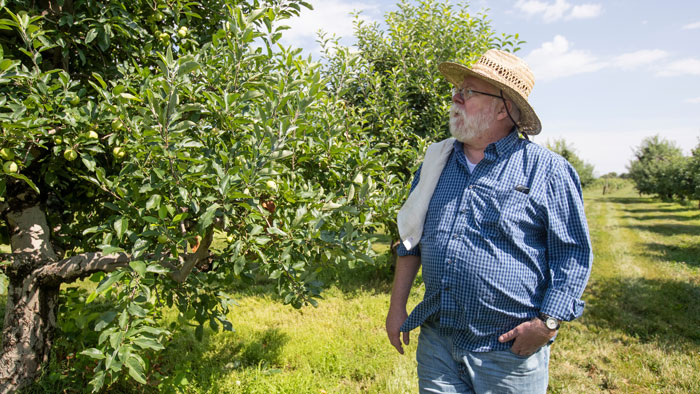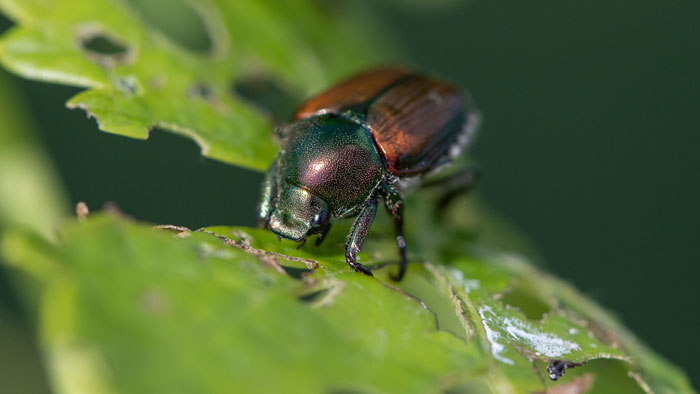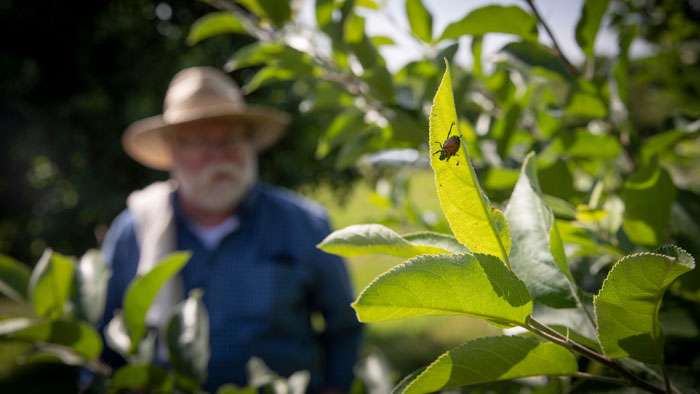Traveling scientist: Finding a home in the lab and field
Instead, it’s the work of the Japanese beetle. But it’s never just one. The beetles arrive in multitudes out of the earth. From white grubs chewing on the roots of your plants, they grow into a swarm that blankets your plants. They eat the tissue, damaging the plants beyond survival.
For farmers, the beetles’ attack is an even greater concern. It’s devastating to a crop, yet it’s just one example of the pests that plague the agricultural industry.
I tend to work with very simple materials, but I’m asking very important questions.
Tipping point
Dr. Maciej Pszczolkowski walks through the vineyard at the Mountain Grove campus. He points out leaf after leaf heavy with Japanese beetles. Staff spray the vines every five days, yet nothing is deterring them today.
It’s a double-edged sword, according to Pszczolkowski, agriculture professor hailing from Poland. Pesticides are necessary, but they should be limited.
“The question is how to mitigate pesticides’ detrimental impact on the environment and humans,” he said.

In the orchard, Dr. Maciej Pszczolkowksi searches for signs of agricultural pests.
Much of his research now focuses on determining that tipping point. What is the least amount of pesticide to apply that allows for the minimal damage to crops but still allows for the necessary amount of pest control? He also looks at improving pesticide formulations, application procedures and the careful timing of application.
The plant and the pest
Pszczolkowski approaches these issues in a variety of ways. He studies the pests – both their biology and their habits. As a brain physiologist, he tries to answer questions about why pests behave the way they do.
He also studies the pest-resistance of different plant varieties.
In the lab, Pszczolkowski’s students look for alternatives to traditional synthetic pesticides. The team tests plant essential oils that could be used as natural insecticides. These bio-insecticides target specific insects.

Japanese Beetle found on a plant at the Mountain Grove campus of Missouri State.
Synthetic pesticides damage human health, water quality and wildlife. They also kill natural pollinators, according to Pszczolkowski’s graduate student, Michael Fenske.
“Synthetic pesticides, while effective, will eventually cause many serious problems that will not be reversible,” Fenske said. On the other hand, bio-insecticides are natural and don’t harm the environment.
Pszczolkowski, who has published more than 60 peer-reviewed articles in his career, loves the balance in his work. He enjoys working in the lab with his students to identify natural solutions to these agricultural problems.
Dr. Maciej’s work in this field of research is essential to everyone’s overall well-being. – Michael Fenske
But nothing compares to the outdoors, he says.
Evolution
Pszczolkowski points to evidence of codling moths plaguing the apple orchard as he ambles among the trees.
“Repetitive use of chemicals leads to insect populations resistant to those chemicals,” he said. “We simply kill sensitive individuals and let the naturally-resistant individuals reproduce.”
To overcome this in the apple orchard, the first three rows remain pesticide-free. This method builds a refuge for the fruit feeders.
Maciej’s work can help people use pesticides more effectively – thus working smarter to reduce waste and protect the environment while still meeting pest management needs. – Dr. Deirdre A. Prischmann-Voldseth, North Dakota State University
Years ago, he discussed this strategy of pest control with Dr. John Dunley, a colleague at Washington State University. Pszczolkowski remembers Dunley saying “insecticide resistance is simply the visible spectrum of evolution. To combat it, one must interact with evolutionary forces, such as natural selection.”
Sustainable future
Pszczolkowski has earned a reputation for understanding insects and manipulating their behavior. He serves as a reviewer for 18 journals in the field. He’s also received more than a quarter of a million dollars in grant funding for projects since coming to Missouri State.
When he looks to the future, he hopes to influence the United States Department of Agriculture’s recommendations on pest control.

Dr. Maciej Pszczolkowksi closely examines the vineyard and orchard at Missouri State’s Mountain Grove campus.
He’s an innovator. So a few years ago, he tempted the codling moths to feed on the foliage instead of boring into the fruit. It took many trials, building off research he had conducted while working in Taiwan, at Washington State University and Kansas State University. Ultimately, he patented a chemical that drives away codling moth larvae from the fruit causing them to feed on foliage and die of natural reasons.
He also designs species specific traps and tests their effectiveness. For a farmer, Pszczolkowski points out, these traps or pesticides have to make economic sense.
“I want to give something to the grower: an insecticide, a method, something,” he said. “Because there are times when one of these would benefit more than the others.”
His work matters: For the overall economy to succeed and for the health of the population, he said, we depend upon farmers’ success.
- Story by Nicki Donnelson
- Photos by Jesse Scheve
- Video by Chris Nagle


I would love Dr. Pszczolkowks’s thoughts on the pheromone boxes I have seen at the Farmer’s Market. I have heard they are effective at catching the Japanese beetles in the large bag connected inside the box, but have also been told by those who have used them when the pheromones are released they will attract the beetles from miles away, making the problem much worse.